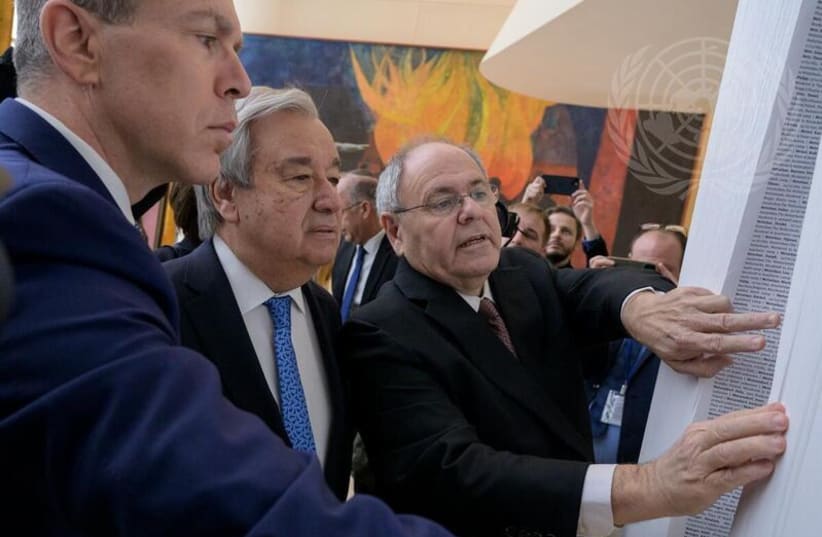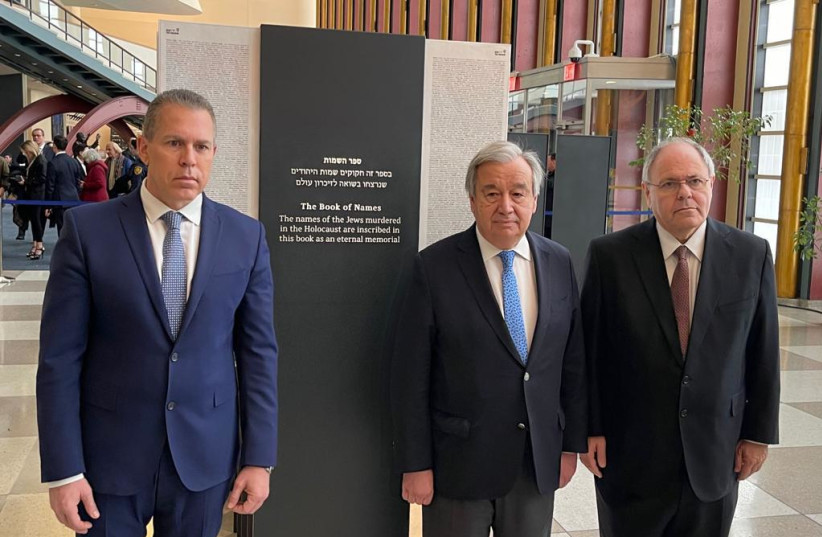NEW YORK – Israel’s Permanent Mission to the United Nations and Yad Vashem on Thursday unveiled a new installation at the UN headquarters in New York City that commemorates the millions of people who were murdered in the Holocaust.The exhibition was installed at the UN headquarters in Manhattan on January 26, one day before International Holocaust Remembrance Day. United Nations Secretary-General António Guterres, Yad Vashem Chairman Dani Dayan and Israel’s Permanent Representative to the UN Gilad Erdan attended the exhibit’s unveiling ceremony, where they addressed political leaders, delegates, Holocaust survivors and their families.
In opening remarks, Guterres recalled his first visit to the Yad Vashem museum in Jerusalem and the many visits he has since made to the museum as UN Secretary-General.
“Thank you to Yad Vashem for bringing this deeply moving exhibition to the United Nations,” Guterres said. “To give the millions who perished an everlasting name. Six million men, women, and children are lost forever but their names will never be forgotten. This exhibit is a call to action, a call to remembrance as we have to find new ways to carry the torch of remembrance. It’s a call to reflection, to see in each of those perished human beings with hopes and dreams. Let us keep the memory of the past alive and never let others forget.”
The book of Names of Holocaust Victims, compiled by Yad Vashem over the past 70 years, features the alphabetically arranged names of 4,800,000 Holocaust victims that have been recorded along with their birthdates, hometowns, and circumstances and places of death if that information is known.
Dayan and Erdan each shared personal testimony.
“I knew that the moving experience I had searching for names at Auschwitz’s vast compilation was an experience that must be made possible for anyone anywhere for any person of any faith who seeks to connect with the Holocaust,” Dayan said. “This is why the UN and Yad Vashem have brought this newly updated book of names here. This is why Secretary Guterres has accepted graciously to bring this book here, to coincide with International Day of Remembrance.” Dayan added that two names particularly stand out to him.
“Nachman and Aryeh were my two great uncles,” Dayan said of his relatives who were victims of Nazi persecution. “They are two names I grew up with, names I associate with pain, sorrow, longing.”
“The Nazis sought to erase the memory of every Jew everywhere,” he continued. “We cannot revive even one of the millions that they murdered but we can and do restore the stories of the victims. We gather every shred of testimony about their values, and their achievements. We painstakingly study the horrible process and events in which their lives were violently stolen. We do this because the victims deserve no less. We are helping to prevent horrors that could even remotely resemble the Shoah. History never repeats itself exactly, but antisemitism, racism, and dictatorships are reoccurring. That is why the book of names is here at the UN today.”
Ambassador Erdan shared the story of his grandfather, who had his eight young children torn from his arms by Nazis in the spring of 1944.
“His wife Bracha and seven of their children were murdered for sole reason of being Jewish,” Erdan said.
“[Those seven children] are eternally enshrined in the Book of Names downstairs,” he continued. “Their memory will live on forever.
Erdan added that the exhibition comes at a crucial time. “Holocaust denial and distortion are on the rise,” he said, pointing to an increase in false information spread on the internet.
“There are those working to erase the memory and lessons that must be learned from our horrific atrocity,” Erdan continued. “They question the right of the Jewish people and Jewish state to protect ourselves. Even here at the UN such bigots can be found.”
“Platitudes are not enough. The time for action is now. The Jewish people demand action. We must not allow evil to prevail. I expect the international community to stand behind Jewish people as we defend ourselves,” Erdan continued.
“This is the fundamental lesson of the Holocaust. The UN, which rose from the ashes of the Holocaust, bears a responsibility to actively combat antisemitism.”
The names in the exhibit are sourced from Yad Vashem’s Central Database of Shoah Victims’ Names and the center’s Pages of Testimony collection, as well as other lists compiled during and following the Holocaust that have been gathered by Yad Vashem scholars. The Book of Names is set to be displayed at the UN headquarters through Febuary 17. After, it will go on permanent show at Yad Vashem museum in Jerusalem and will open to public ahead of Israel’s Holocaust Remembrance Day in April. An earlier installation of the Book of Names is on permanent display at the Auschwitz-Birkenau State Museum in Poland.

